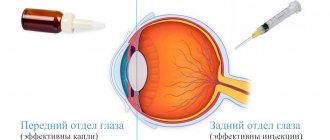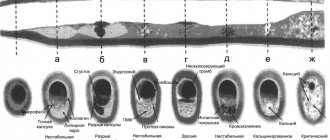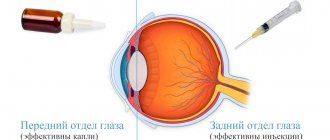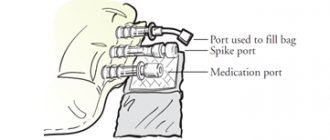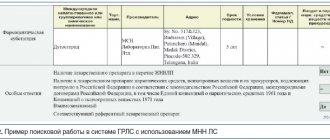Colic is a natural phenomenon that occurs in all children from infancy. Symptoms of colic can appear in the first weeks of a baby’s life and can prevent parents from sleeping for a couple of months. But you shouldn’t worry about colic as a disease, because this phenomenon occurs in every child, regardless of the baby’s health. What are the causes of colic, how to recognize them and help your baby?
Causes of colic
There are many reasons for the formation of colic in a baby’s intestines, but there are also primary sources - the main causes of the disease. Most often, colic appears due to:
Features of the digestive system
All organs of the baby’s gastrointestinal tract begin to become familiar with food and new working conditions. The circulatory system begins to adapt to living conditions, and muscle tissue to heaviness and new load. Despite the fact that nature has provided the most optimal nutrition for the baby - breast milk, the child’s stomach and intestines also have to get used to it. Contractions of all internal organs, movements of the baby, the balance of digestive enzymes and even breathing patterns - all this affects digestion. Immaturity of the gastrointestinal tract is the root cause of colic, causing discomfort in the intestines, spasms and severe pain for the baby due to increased gas formation. Further, problems with defecation and severe belching may appear. These symptoms are completely normal, but babies are especially sensitive to them. When the digestive system fully adapts to food and the digestion process, colic will no longer bother the baby.
Attaching to the breast
Very often, colic also occurs from improper attachment of the baby to the mother's breast. Because of this, the baby may latch onto the breast incorrectly and inhale a large amount of air through his mouth during feeding. This can cause bloating and intestinal colic.
Mother's nutrition If the child is breastfed, you should take care of your nutrition. There are special diets for nursing mothers, and they will definitely come in handy if the baby often suffers from colic.
Baby's diet It is worth ruling out the possibility of a violation of the diet in order to find out the cause of colic. This point is a bone of contention among many pediatricians, because some believe that feeding must be according to a schedule, while others are of the opinion that feeding should only be done at the request of the baby. Only the child’s mother can determine the correct option. You can adhere to a specific strict regimen and feed every three hours, monitoring the baby’s condition, or change the strict system to feeding on demand. If there is no change in condition, the cause is excluded.
Formula for feeding If the baby is bottle-fed, the cause of colic may be the formula. You need to change the mixture to a different brand and composition or carefully follow the rules for preparing the mixture.
Characteristic features of the baby Often, colic manifests itself as a reaction to the baby's emotions - crying, anxiety and severe restlessness. Strong crying, intensive swallowing of air and excessive nervousness can cause frequent occurrence of colic in a newborn.
Enzymes - cures for bloating and gas
Enzyme deficiency, manifested by pain, epigastric discomfort, bloating, flatulence and belching, requires the use of enzyme replacement drugs.
The basis of therapy for pancreatic insufficiency is pancreatin preparations [1].
They contain pancreatic enzymes: amylase, lipase and trypsin. Pancreatin provides a sufficient range of digestive activity and relieves signs of exocrine pancreatic insufficiency, including nausea, rumbling in the abdomen, flatulence and other symptoms [1].
The dose of drugs depends on the degree of enzyme deficiency and the content of lipase in the drug. In addition, the fat content in the diet should be taken into account: the higher it is, the higher the dose of the drug is required. Before the main meal, the dose of enzymes can vary from 25,000 to 80,000 units of lipase. Pancreatin is contraindicated in pancreatitis and intestinal obstruction.
Complex enzymes with bile extract are also indicated for overeating, for example, a combination of pancreatin, hemicellulase and bile components [2].
Bile has proteolytic, amylolytic and lipolytic effects, promotes rapid and complete digestion of food, eliminates the feeling of heaviness and fullness in the stomach, flatulence, shortness of breath due to the accumulation of gases in the intestines, and diarrhea [3]. Bile extract has a choleretic effect, promotes emulsification of fats and improves their absorption, increasing lipase activity. The third component of the combination, hemicellulase , helps break down plant fiber [3].
Complex enzyme preparations containing bile components are contraindicated for cholelithiasis, obstructive jaundice, acute pancreatitis and exacerbation of chronic pancreatitis, as well as for liver failure [3].
Let us add that enzyme preparations are prescribed before or during the festive dinner.
Symptoms of colic in infants
How to identify colic in an infant and not confuse the symptoms with more serious illnesses? It is worth focusing on the following signs:
- severe bloating, rumbling;
- the child calms down only after the gases have passed;
- severe crying;
- colic appears from the tenth day of life and can bother the child until the fourth month;
- the baby curls his fingers and toes;
- the stool remains familiar and unchanged;
- the baby presses his legs to his stomach;
- the face turns red when crying;
- Colic occurs most often in children who quickly gain weight.
These simple symptoms will help parents distinguish colic from diseases of the digestive system and choose the right treatment for colic. The best option would be to consult a specialist who will recommend effective methods and high-quality effective carminative drugs.
Natural carminatives
How often do we forget that we are surrounded by countless medicinal herbs. They can help everyone cope with various ailments. For each disease, in addition to the medicine sold in the pharmacy, you can choose a natural analogue, which often has a much milder effect. And as we mentioned above, for children such treatment in many situations is better than the use of chemicals, which, moreover, may also be of poor quality.
How to help a child with colic?
Many parents worry about how to take care of their baby during colic and alleviate his condition. There are some simple but very effective techniques that effectively relieve pain when colic occurs and speed up the release of gas. Simple tips on massaging the abdominal wall and correct positioning of the baby will help you quickly cope with colic:
- Stroking the tummy, gently moving clockwise.
- Place a warm palm on the baby's stomach and lightly rock the baby in your other hand.
- Attach the baby to the breast when colic appears, rocking slightly. This will help relieve colic, relax the baby and calm him down.
- Place a warm diaper on the tummy, pre-heated on a radiator or ironed.
- Do simple but effective gymnastics-massage of the abdominal wall, pressing your knees towards the baby’s tummy. It is effective to press your right knee towards your left elbow and vice versa. This will help relax the muscles and provoke the rapid release of gases.
- Do the Airplane exercise. The baby should be placed on his tummy and slowly rocked in different directions. This should be done very smoothly and carefully. This exercise will not only help calm the baby and relieve colic, but also greatly amuse the child when he begins to be capricious.
- Tiger pose on a branch will help relieve colic and calm the baby. A great massage position for dads with strong arms. It is worth bending your arm at the elbow and laying the child down - belly down. The baby's head should be in the palm of your hand. By gently shaking your hand, you can calm your baby and overcome colic.
- A warm bath with herbal decoctions will help to effectively remove colic and alleviate the condition of the baby. This method is especially relevant if the child loves to swim. You need to organize a bath with a warm decoction of chamomile or chamomile, which will perfectly calm you down and set you up for a healthy sleep.
- A gas tube is the last option and is only suitable for severe and painful colic. This method is the most effective, but the baby quickly gets used to the device and will no longer be able to do without it. In addition, such a device can harm the anal mucosa. If parents nevertheless decide to resort to this method, it is worth lubricating the tip of the device with baby cream or Vaseline and inserting it two centimeters, but no more. This method may cause deficiencies.
Traditional medicine for flatulence
- Dill. Our grandmothers always used dill, or rather its seeds, when dealing with gas, especially when it concerned children. Anyone can get them, they do no harm, but their benefits have been proven for centuries. So, all you need is to brew 2 tablespoons of dill seeds in half a liter of boiling water, cool and take half a glass 15-20 minutes before meals.
- Caraway. There are many recipes based on it that help with diseases. Cumin seeds are rich in various active substances. You need to brew it in the same way as dill. Just take half the dose. Not a tablespoon, but a teaspoon per glass of boiling water. Drink half a glass 2-3 times a day, or a third.
- Fennel. The fruits are used to prepare the infusion. Take a tablespoon of fennel, pour 250 ml of boiling water, let it brew. Take in the same way as the previous remedy.
- Ginger. The root is used here. This infusion can be drunk as tea. And it's very easy to do. Cut a piece no larger than one centimeter from the root, pour boiling water over it, cool, add honey and lemon.
- Chamomile. Everything is prepared according to the same principle. A spoonful of dry herbs per glass of boiling water. You can additionally use honey, mint, lemon, caraway seeds and dill. It is enough to take 1 tablespoon of this composition 2 times a day.
Colic medications
For severe and very painful colic, special medications are also applicable, but only after the appointment of a specialist. It is the doctor who will competently select the optimal drug for the baby. The following list of effective drugs is recognized as the most effective drugs:
- Capsules or suspension Espumisan L Refers to effective carminative drugs. There are three types in the Espumisan line, but you should pay attention only to the medicine for newborns. Espumisan can be given to a child from the first day of life. The product will effectively relieve colic and help remove gases. The product has a pleasant banana taste, so giving it to your baby is not a problem at all. The first dose is 25 drops and can be mixed with breast milk or given alone.
- Suspension Sab Simplex The drug removes and destroys gas globules and carefully removes them from the baby’s body during intestinal peristalsis. The product will perfectly eliminate colic and is absolutely safe for the baby.
- Bobotik drops The advantage is that the drug is not absorbed into the gastrointestinal tract and comes out unchanged, while perfectly relieving the baby of colic. The drug does not contain sugars and is suitable for addition to formula or breast milk. One bottle contains 50 doses of medicine, so the product will last for a long time.
- Plantex powder The product is designed to combat colic and is extremely popular among parents. The drug is made from fennel fruit and works on the principle of dill water. The drug perfectly accelerates the release of gases and improves gastrointestinal motility. The advantage is that it regulates the digestive system and increases the baby’s appetite.
- Infacol suspension Facilitates the release of gases from the intestines, relieves spasms and reduces the baby’s pain. The drug does not have a systemic effect and is excreted unchanged from the child’s body. Can be taken from the first weeks of life. The course of the drug is determined by a specialist.
- Bebinos Drops Has a pronounced antispasmodic and carminative effect, helps with flatulence, colic and pain. Developed on the basis of plant extracts, in particular fennel and chamomile. The drug has an anti-inflammatory effect and relieves pain, carefully normalizing the functioning of the gastrointestinal tract. The product improves digestion and peristalsis.
- Bifiform baby suspension Eliminates intestinal colic and fights pathogenic organisms. It is a means of heavy artillery. The suspension perfectly kills microbes, but at the same time preserves bacteria beneficial to the microflora. The product reduces the risk of acute diarrhea in the baby.
- Linex capsules Restores the child's intestinal microflora, eliminates pathogenic microorganisms. The drug helps restore normal bowel function and ensures optimal action of intestinal enzymes. The drug takes care of the intestinal microflora and the normal balance of lactic acid bacteria in the gastrointestinal tract.
- Baby Calm Emulsion The product is based on vegetable oils, in particular anise, dill and fennel oil. The product acts on the principle of dill water and perfectly eliminates colic in the baby. This effective remedy for babies helps eliminate flatulence and normalize microflora. The advantage of the drug is its mild antispasmodic effect. This emulsion has a pronounced anti-inflammatory effect and antibacterial effect. Provides carminative effect.
Parents should remember that only a doctor can prescribe the appropriate drug and treatment regimen for the baby. It is worth excluding not only intolerance to certain drugs, but also allergies to components. Also, the doctor will be able to determine the optimal dose of the drug for a particular baby in accordance with the weight and age of the child.
pharmachologic effect
Carminatives reduce gas formation in the intestines by reducing the surface tension of gas bubbles, allowing them to coalesce and be eliminated naturally. At the same time, the accompanying symptoms of bloating - pain and cramps in the abdomen - disappear.
Herbal carminatives relax smooth muscles, eliminating intestinal spasms.
In addition, herbal carminatives have a moderate anti-inflammatory effect.
How to prevent colic
There are many methods to prevent colic or its frequent occurrence. Some practical tips will help you effectively and efficiently minimize the occurrence of colic. In particular:
- you need to put the baby on his tummy before feeding;
- The baby should lie on a hard surface, for example, a hard mattress. This will relieve tension in the abdominal muscles and prevent the occurrence of colic;
- After feeding, it is recommended to hold the baby in an upright position and wait for the appearance of a burp. This method will help to painlessly remove gases from the baby’s body;
- Dill water is one of the ancient methods of ridding a child of gas. This water should be given after each feeding of the baby. It’s very simple to prepare – you just need to steep half a spoonful of seeds in a glass of boiling water. It is worth giving your child only slightly warm dill water.
Gastrointestinal motility stimulants
A New Year's diet, replete with fatty, spicy and salty foods, can increase the production of the neuropeptide hormone cholecystokinin [4], which inhibits the motor-evacuation function of the stomach, which is manifested by a feeling of fullness in the stomach, epigastric pain, nausea, and in severe cases, vomiting. To relieve these manifestations, motor stimulants, or prokinetics, are used.
Metoclopramide, known to several generations of doctors and patients, has prokinetic activity.
As an antagonist of dopamine and serotonin receptors, metoclopramide stimulates the motility of the upper gastrointestinal tract, improves the amplitude of gastric contractions, relaxes the pyloric sphincter and duodenal bulb. In addition, metoclopramide has an antiemetic effect, which is due to the blockade of central and peripheral D2-dopamine receptors. However, along with proven effectiveness, the widespread use of metoclopramide is limited by frequent side effects (almost 30% of cases), including headache, drowsiness, hormonal disorders and other adverse events [5].
A modern and well-tolerated alternative to metoclopramide is the highly selective peripheral dopamine D2 receptor blocker domperidone.
By inhibiting dopamine receptors, the drug increases the release of acetylcholine, which provides an antiemetic effect. In addition, domperidone has a gastrokinetic effect, increases the duration of antral and duodenal contractions, accelerates gastric emptying, and also increases the pressure of the sphincter of the lower esophagus. Maximum absorption of the drug occurs when it is used before meals, that is, in our case, before a gala dinner. Domperidone belongs to the over-the-counter group of drugs and is used to treat adults and children, including newborns.
Along with domperidone, itopride is used as a stimulant of gastrointestinal motility.
It has a dual mechanism of action: the drug interacts with D2-dopamine receptors and also inhibits acetylcholinesterase, which leads to activation of propulsive gastric motility. Itopride accelerates the transit of food through the stomach and ensures faster emptying. Unlike domperidone drugs, itopride is available only with a doctor's prescription.
Diet for mom
A proper mother's diet will help prevent possible gas formation and flatulence in the child. Many products are absolutely safe for the body of both mother and baby, but there are also aggressive ones that often cause unwanted colic.
A mother who feeds her baby milk for up to four months should completely exclude the following foods from her diet:
- Cabbage of any kind;
- Coffee and tea;
- Tomatoes;
- Dishes with hot and fiery seasonings;
- Onion;
- Nuts;
- Products with caffeine;
- Tomatoes;
- Cow's milk;
- Corn
- Sour cheese;
- Legumes.
If the child's colic is caused by any of these foods, then after a two-day diet they should completely go away.
No matter how parents worry about colic, this is a completely normal occurrence for infants. You should take this calmly and help your child cope with the disease using simple and effective methods. In case of complications and extreme painfulness of the process, the best option would be to contact a pediatrician, who can competently prescribe an anti-colic medication exclusively for your baby - based on age and weight. Proper treatment will solve the problem and prevent the worsening of flatulence.
Indications for use
Carminative drugs are used for diseases that are accompanied by excessive, excessive gas formation and bloating (flatulence): irritable bowel syndrome, intestinal colic, functional dyspepsia, colitis.
Carminative drugs are also used to treat symptomatic flatulence during pregnancy, colic in newborns, as well as in patients with lactase deficiency in violation of a dairy-free diet.
In addition, antiflatulents are prescribed to reduce gas formation before instrumental examinations of the gastrointestinal tract and abdominal cavity - ultrasound, radiography, etc., as well as in case of excessive gas formation after intestinal operations.
Carminatives from the group of silicones are also used for poisoning with detergents.

